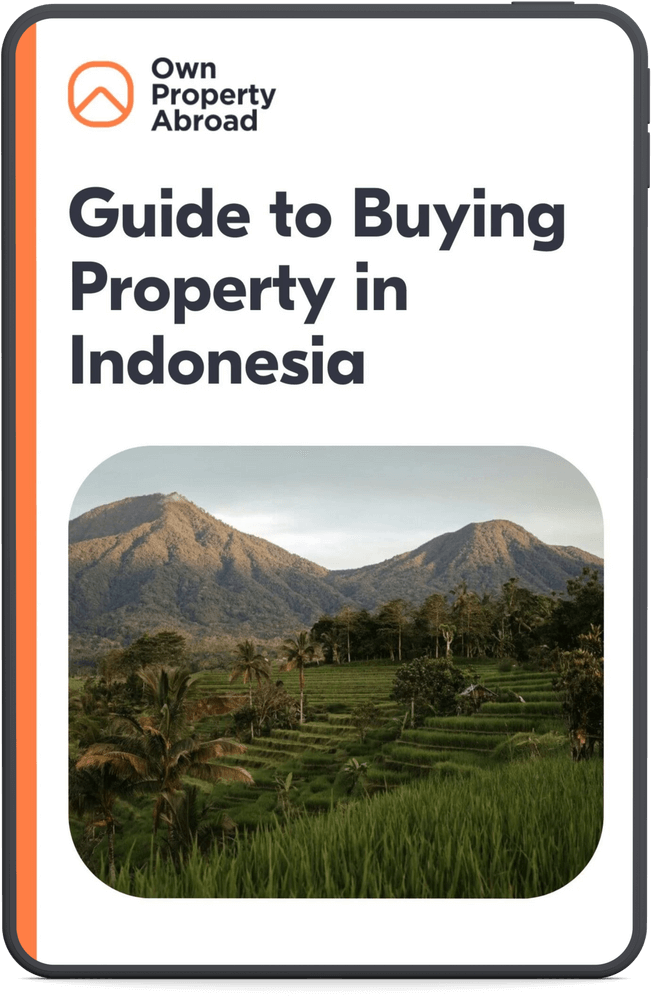Overview of property taxes in Indonesia
There are several property taxes in Indonesia. This article will discuss the following taxes:
- Annual property taxes in Indonesia
- Land and Building Tax (PBB)
- Rental income taxes in Indonesia
- Personal Income Tax (PIT)
- Corporate Income Tax (CIT)
- Withholding Tax (PPh)
- Taxes on the transfer of land and buildings
- Transfer Tax (BPHTB)
- Value Added Tax (VAT)
- Construction Tax
- Documentary Stamp Tax (DST)
- Legal fees
We have provided detailed explanations for each of these property taxes in Indonesia.
Valuable insights and practical advice, distilled from years of expertise and real-world experience.


Annual property taxes in Indonesia
1. Land and Building Tax (PBB)
The Land and Building Tax, or Pajak Bumi dan Bangunan (PBB) in Indonesia, is the most fundamental property tax paid by all owners of Indonesian property. The individual or entity with the right to control and own the land pays PBB tax.
The PBB tax rate is based on the land’s and building’s valuations valued separately. Landowners pay the Land and Building Tax annually to the Directorate General of Taxes (Direktorat Jenderal Pajak, Kementerian Keuangan Republik Indonesia). Before, the PBB rate varied between 0.01% and 0.3%. The Indonesian government has increased the PBB rate in 2022 to 0.5%. If land and buildings are used for nonprofit activities such as social and educational endeavors, as well as health care services, they may qualify for a 50% reduction in property tax rates.
To calculate the PBB tax, you need the NJOP and NJKP:
- NJOP (Nilai Jual Objek Pajak) is the average price obtained during the real estate transaction. If there has not been a real estate transaction recently, the NJOP is determined by the local government by comparing the property with seminar objects.
- NJKP (Nilai Jual Kena Pajak) is the appraisal value calculated based on the NJOP.
The NJKP can be calculated with the following formula:
NJKP = 40% or 20% x (NJOP – NJOPTKP)
- 40% if the property value is at least IDR 1 billion ($61,000)
- 20% if the property value is less than IDR 1 billion ($61,000)
- NJOPTKP is IDR 12 million ($732)
The PBB tax can be calculated with the following formula:
PBB = 0.5% x NJKP
For example, we have a property with an NJOP value of IDR 5.8 billion ($353,800).
- NJKP = 40% x (IDR 5,800,000,000 – IDR 12.000.000) = IDR 2.32 billion ($141,227)
- PBB = 0.5% x IDR 2,315,200,000 = IDR 11.58 million ($706)
According to the calculations, the property owner has to pay IDR 11.58 million ($706) every year for PBB tax.
Land and Building Tax (PBB) calculator
Calculate the PBB tax for your property with our calculator:
Who pays the Land and Building Tax in Indonesia?
The individual or entity who owns the land or building through Hak Milik (HM) or Hak Guna Bangunan (HGB).
When do you file and pay the Land and Building Tax?
The Indonesian tax authorities send taxpayers a tax-due notice letter, called Surat Pemberitahuan Pajak Terutang (SPPT), with the tax amount to be paid. The PBB tax must be paid within six months after the SPPT issue.

Rental income taxes in Indonesia
1. Personal Income Tax (PIT)
Indonesian tax residents pay Personal Income Tax over the income generated with property rental. Foreigners staying more than 183 days over a year in Indonesia are considered tax residents. This means the foreigner has to pay Personal Income Tax, a progressive tax that is graduated according to the yearly income of the tax resident. The table below shows an overview of Indonesia’s Personal Income Tax.
| Income | Tax rate |
|---|---|
| Up to IDR 60 million ($3,660) | 5% |
| IDR 60 million ($3,660) – IDR 250 million ($15,250) | 15% |
| IDR 250 million ($15,250) – IDR 500 million ($30,500) | 25% |
| IDR 500 million ($30,500) – IDR 5 billion ($305,000) | 30% |
| Over IDR 5 billion ($305,000) | 35% |
The following types of income are subject to Personal Income Tax:
- Income from employment;
- Dividends, interest income, and royalties earned onshore and offshore;
- Rental income and capital gains.
Who pays Personal Income Tax?
Indonesian and foreign nationals who are Indonesian tax residents and generate income through property rental or by selling property pay Personal Income Tax.
When do you pay Personal Income Tax in Indonesia?
The PIT should be filed by March 31st of the following year, while the payment deadline is on the 10th of the following month.
2. Corporate Income Tax (CIT)
If the property is owned by a property, such as a PT PMA (foreign-owned company), the property has to pay Corporate Income Tax on the income and capital gains earned on the property. The income is taxed at a flat rate of 22%.
| Type | Tax rate |
|---|---|
| Income from property | 22% |
Who pays the Corporate Income Tax?
Companies, such as PT PMA, pay Corporate Income Tax.
When do you file and pay the Corporate Income Tax?
The CIT should be filed by April 30th of the following year, while the payment should be performed by the 10th of the next month.
3. Withholding Tax (PPh)
Non-residents who own property in Indonesia and generate income must pay Withholding Tax. This tax is sometimes called rental income tax or lease tax and is based on the property’s gross rental income. Property owners must report their rental income and calculate the tax amount on their annual tax returns.
It’s important to note that the Withholding Tax differs from the Personal Income Tax. Foreigners who are tax residents in Indonesia and earn money by renting out their property might have to pay taxes over their income twice.
| Withholding Tax | Tax rate |
|---|---|
| Indonesian tax resident | 10% |
| Non-tax residents | 20% |
The 20% Withholding Tax is the default rate and applies unless a Double Tax Agreement (DTA) exists between Indonesia and the non-resident’s home country. With a DTA, the tax rate for non-resident individuals may be reduced to 10%.
Who pays the Withholding Tax in Indonesia?
Individuals who rent their property in Indonesia to generate income.
When do you file and pay the Withholding Tax?
The PPh should be filed by the 20th of the following month and paid by the 10th of the next month.
Valuable insights and practical advice, distilled from years of expertise and real-world experience.


Taxes on the transfer of land and buildings
1. Transfer Tax (BPHTB): Paid by the buyer
In Indonesia, those who buy property or land must pay a tax referred to as the Transfer Tax, called Bea Pengalihan Hak atas Tanah dan Bangunan (BPHTB) in Indonesian. This tax is also called the land acquisition tax.
The tax has a flat rate of 5% applied to the Tax Object Acquisition Value, otherwise known as Nilai Perolehan Objek Pajak (NPOP), after deducting the value of non-taxable real estate assets, known as Nilai Perolehan Objek Pajak Tidak Kena Pajak (NPOPTKP). The BPHTB tax is a one-time payment made at the time of the property transaction. The notary will not authorize the property transfer deed until the Transfer Tax is wholly paid.
Here is how you determine the BPHTB tax:
BPHTB = 5% x (NPOP – NPOPTKP)
Transfer Tax (BPHTB) calculator
You can calculate the Transfer Tax with this calculator.
Who pays the Transfer Tax (BPHTB) in Indonesia?
The buyer of the property pays the Transfer Tax (BPHTB).
When do you file and pay the Transfer Tax (BPHTB)?
You pay the Transfer Tax before signing the deed of transferring rights. The notary won’t sign the agreement until the BPHTB tax is paid.
2. Value Added Tax (VAT): Paid by the buyer or leaser
Value Added Tax (VAT), or Pajak Pertambahan Nilai (PPN), is paid when you buy or lease property from a commercial property. This is the case when a consumer buys or leases property directly from a developer or consumer, like a new house or off-plan property. Transactions of buying and selling secondary properties or houses that already have been used are not subjected to VAT. The VAT has a rate set at 11% of the transaction value.
Who pays the Lease Tax in Indonesia?
The buyer of the leasehold property pays the Lease Tax.
When do you file and pay the Lease Tax?
You pay the Lease Tax when signing the deed of transferring rights.
Construction Tax
Property owners must pay Construction Tax when they develop a building on their land. The tax rate is 1.75% of the building’s construction budget (Rancangan Anggaran Biaya). If a contractor does construction, the contractor will pay the Construction Tax. You have to pay the Construction Tax when construction is privately done.
Who pays the Construction Tax in Indonesia?
The property owner pays the Construction Tax unless a constructor manages the construction. In that case, the constructor pays the Construction Tax.
When do you file and pay the Construction Tax in Indonesia?
You pay the Construction Tax after the construction of the property is finished.

Documentary Stamp Tax (DST)
Documentary Stamp Tax (DST) is a tax imposed on certain legal documents or instruments executed, issued, or transferred in Indonesia. These documents include (but are not limited to) deeds, mortgages, leases, bills of exchange, and other similar instruments. The tax is flat at IDR 10,000 ($0.61) and is paid when legalizing the document.
| Type | Tax rate |
|---|---|
| Flat rate | IDR 10,000 ($0.61) |
Legal fees
Having transactions carried out by the land officials is necessary to complete property transactions. These officials are appointed by the Head of the National Land Office or a local Head of District, including notary publics. The cost for this service is 1% of the property’s value.
Legal fees are typically charged as a percentage of transaction costs, ranging from 0.5% to 1.5%. Additionally, the seller is responsible for paying agent fees, which usually amount to around 5% of the transaction value.
Need help with property taxes in Indonesia?
Are you unsure about property taxes in Indonesia? Leave your name and email below, and our experienced team will assist you with understanding, filing, and reporting your taxes accurately. You can also directly email us at [email protected]. We provide comprehensive support to ensure you comply with all tax regulations and avoid any pitfalls. Whether you need help with legalities or tax documentation, we’ve got you covered. Start your hassle-free property journey in Indonesia today with our personalized assistance!
Valuable insights and practical advice, distilled from years of expertise and real-world experience.


Frequently Asked Questions (FAQs)
Do foreigners pay property taxes in Indonesia?
Foreigners are required to pay property taxes in Indonesia. This applies to properties they own or lease, including land and buildings. The tax is typically a percentage of the property’s assessed value.
What is the rental tax in Bali?
Rental income in Bali is subject to Personal Income Tax, Corporate Income Tax, or Withholding Tax, depending on the property ownership type and the property owner’s nationality.
What is property income tax in Indonesia?
The property income tax in Indonesia is subject to Personal Income Tax, Corporate Income Tax, or Withholding Tax, depending on the property ownership type and the property owner’s nationality.
How much is real estate tax in Indonesia?
The real estate tax in Indonesia is called Pajak Bumi dan Bangunan (PBB) and is levied at a tax rate of 0.5%. This real estate tax is charged annually based on a percentage of the property’s assessed value.
What are the most important property taxes in Indonesia?
The Land and Building Tax and Transfer Tax are the most important property taxes in Indonesia. However, you should be aware of several other property taxes in Indonesia, such as the Personal Income Tax, Corporate Income Tax, Withholding Tax, Value Added Tax, Construction Tax, and Documentary Stamp Tax.




